Marjorie Cohn reports on the Biden administration’s loyalty to Trump’s policy of maximum economic pressure on Cuba.
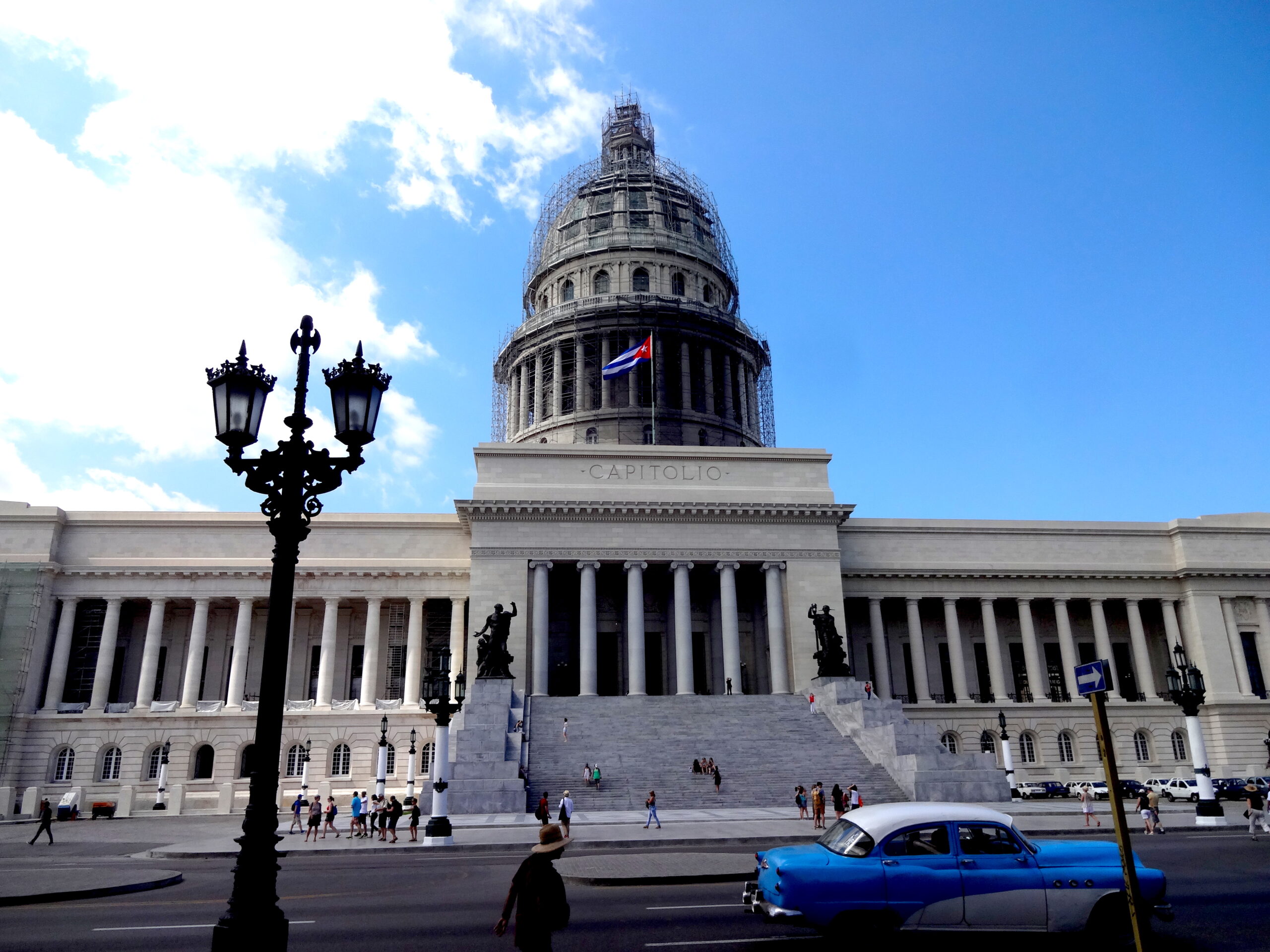
Cuban Capitol in Havana, 2018. (Rômulo Ferreira, CC BY 2.0, Wikimedia Commons)
 “The current U.S. government, the one of Joseph Biden, of all those that the Cuban Revolution has known, is the one that has most aggressively and effectively applied the economic blockade,” Carlos Fernández de Cossío, vice minister of foreign affairs of Cuba, declared in a speech last month. “It is the one that punishes the most, the one that causes the most damage to the daily life of Cubans and the economy as a whole.”
“The current U.S. government, the one of Joseph Biden, of all those that the Cuban Revolution has known, is the one that has most aggressively and effectively applied the economic blockade,” Carlos Fernández de Cossío, vice minister of foreign affairs of Cuba, declared in a speech last month. “It is the one that punishes the most, the one that causes the most damage to the daily life of Cubans and the economy as a whole.”
Fernández de Cossío cited the disruption of Cuba’s fuel receipt by sea, and economic depression resulting in the “extraordinary flow of Cuban migrants” as examples of the severe harms that Cubans have faced due to the Biden administration’s implementation of the blockade.
In his address at a conversation series on “Cuba in the Foreign Policy of the United States of America,” held on Dec. 14 at the Higher Institute of International Relations in Havana, Fernández de Cossío took aim at the Biden administration’s enforcement of the blockade against Cuba, stating, “there can be no doubt that the economic blockade is the defining factor in the bilateral relations” between the United States and Cuba.
Biden pledged during his 2020 presidential campaign that he would “try to reverse the failed Trump policies that inflicted harm on Cubans and their families.” In 2021, he claimed, “We stand with the Cuban people.”
But Biden’s actions belie his words. Fernández de Cossío said that Biden has applied “with absolute and surprising loyalty … the policy of maximum economic pressure that was designed by his predecessor, Donald Trump.”
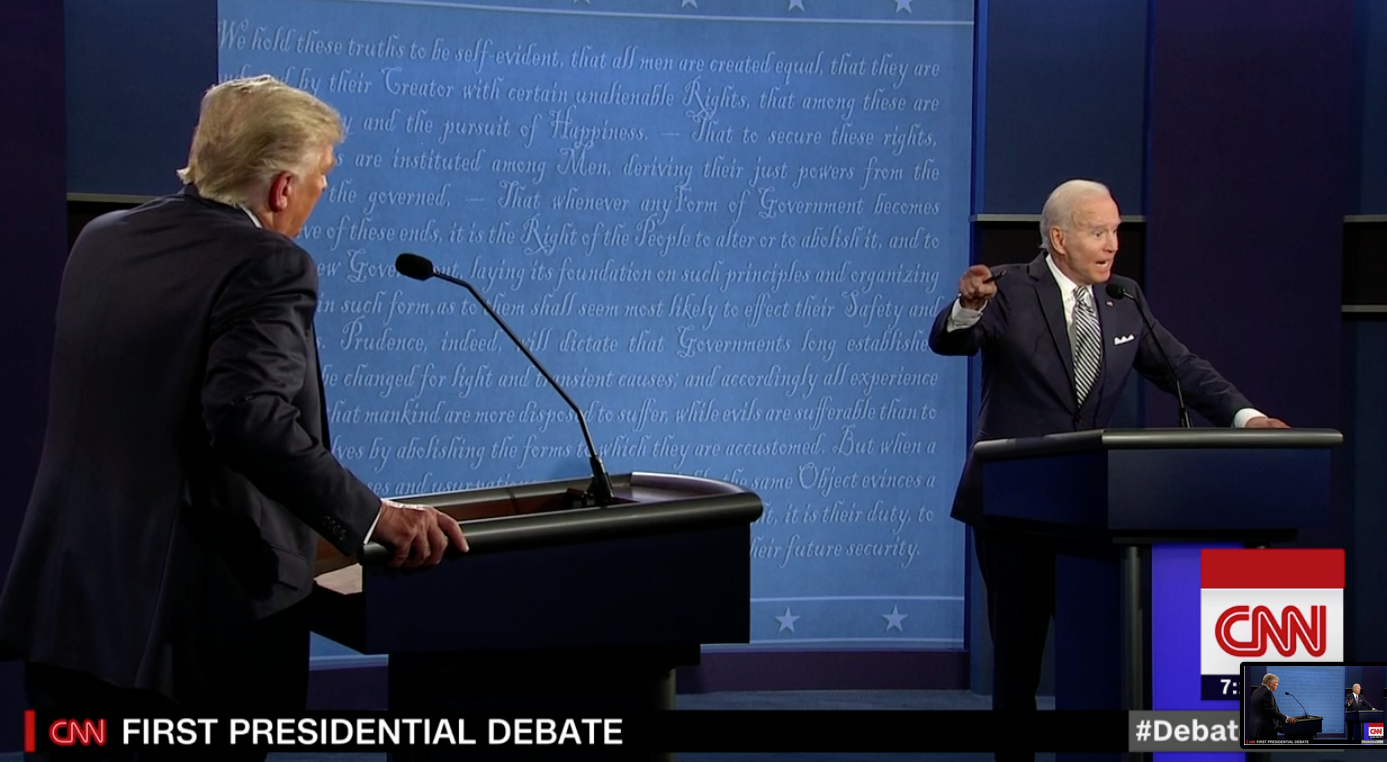
U.S. presidential debate, Sept. 29, 2020. (Screenshot)
In 2015, the Obama administration restored full diplomatic relations with Cuba, released Cubans imprisoned in the U.S. for trying to deter further terrorist attacks against Cuba, relaxed restrictions on Americans traveling to Cuba, and ended some economic prohibitions between the U.S. and Cuba. It also facilitated the export of U.S. internet hardware and telecommunications and established increased cooperation between the United States and Cuba in intelligence-gathering, drug interdiction, scientific research and environmental protection.
Trump undid the progress Obama had made and imposed 243 onerous new sanctions — known as unilateral coercive measures in international law — on Cuba as part of his “maximum pressure” strategy.
Imposed to Cause Hunger & Desperation
More than 60 years ago, following the triumph of the 1959 Cuban Revolution, the U.S. government imposed an economic embargo on Cuba. The rationale for the embargo was detailed in a State Department memo that advocated the “disenchantment and disaffection” of the Cuban people through “economic dissatisfaction and hardship” so they would overthrow the Fidel Castro government. The memo recommended the denial of “money and supplies to Cuba, to decrease monetary and real wages, to bring about hunger, desperation and overthrow of government.”
Support CN’s
Winter Fund Drive!
The embargo (which the Cubans call a blockade) “is not a single law, but a complex patchwork of laws, presidential proclamations and regulations that Fidel Castro once called ‘a tangled ball of yarn,’” American University professor and Cuba scholar William M. LeoGrande wrote in the National Security Archive. “It has evolved over the sixty years since President John F. Kennedy put it in place, loosening and tightening from one administration to the next, depending on the president’s preference for using hard power or soft power in dealing with Cuba.”
Since the Cuban Revolution, the United States “has waged an unceasing assault, both military and economic, against the Cuban people, organizing an invasion, assassinations, terrorist attacks against civilians and systematic economic sabotage,” Isaac Saney wrote at Resumen. The blockade has cost Cuba more than $130 billion in damage, according to the United Nations.
Some Positive Bilateral Steps
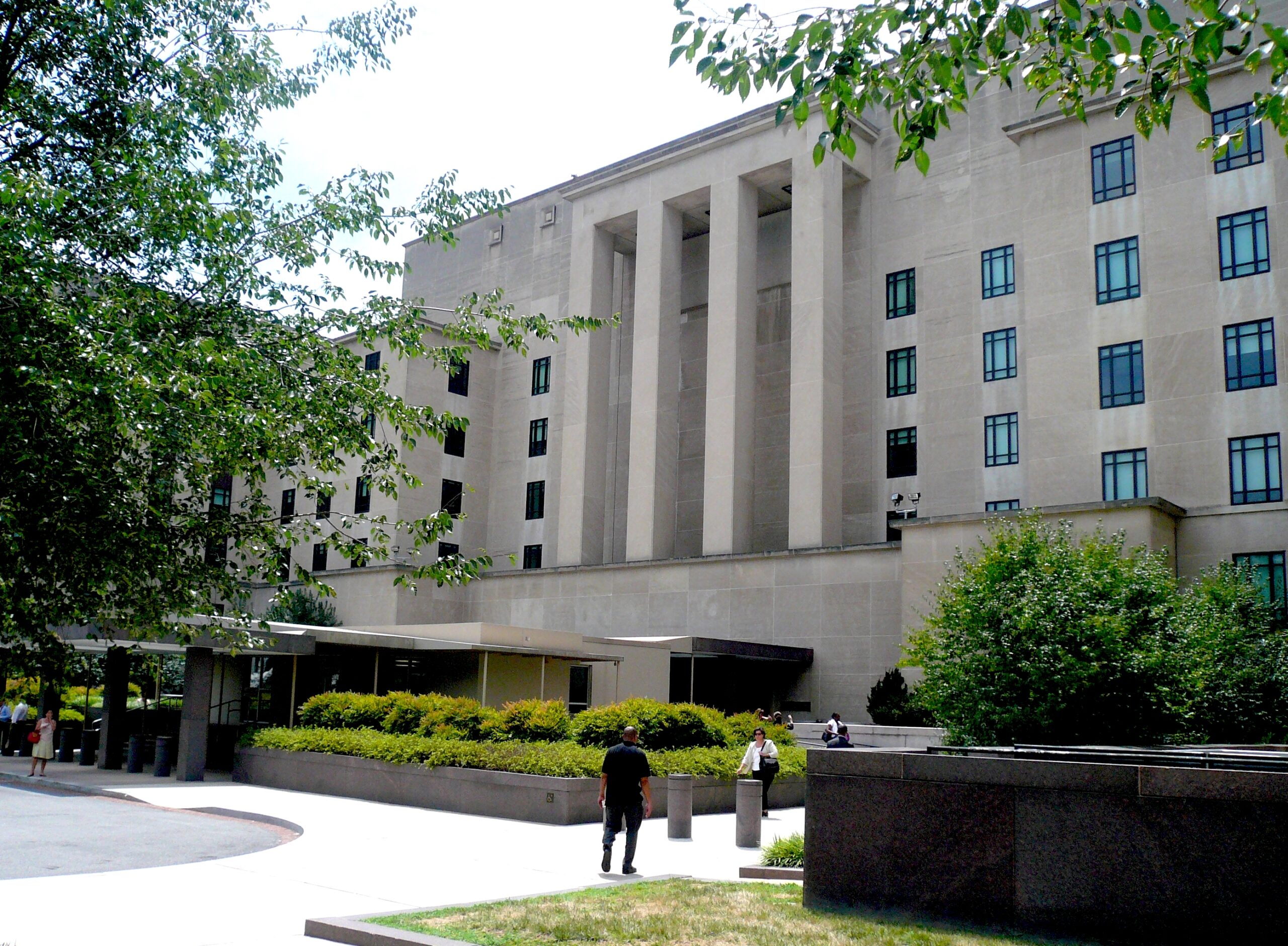
U.S. State Department headquarters in Washington. (Ctac, CC BY-SA 3.0, Wikimedia Commons)
Despite this rocky history, Fernández de Cossío acknowledged that some positive bilateral steps were taken between the United States and Cuba last year.
He cited migration cooperation; U.S. grants of 20,000 visas annually; a return to U.S. embassy services in Havana; cooperation between Cuban Border Guard Troops and the U.S. Coast Guard for interception on the high seas and return to Cuba; an agreement to hold exchanges on law enforcement, oil spills, health and the environment; and commercial flights from the United States to different Cuban provinces. The United States has again authorized “people to people” educational group travel to Cuba, but individual travel for education is still prohibited.
Fernández de Cossío also praised U.S. offers of humanitarian aid to Cuba “without political conditions” after a fire at the supertanker base in Matanzas last August and $2 million for repairs after Hurricane Ian. But Cuba still has not received that assistance.
Negative Steps
The vice minister of foreign affairs also listed “developments in the opposite direction.” These include the recent U.S. designation of Cuba as a country of special concern in matters of religious freedom “without any real basis, on grounds that are dishonest.”
“In late 2022, the Biden administration took the unprecedented action to list Cuba as a nation of ‘special concern’ regarding religious freedom — which even the Trump administration did not do, and which was not recommended by the related commission created by U.S. law. This is absurd,” Art Heitzer, co-chair of the National Lawyers Guild’s Cuba Subcommittee, told Truthout.
“Members of my Methodist church were prosecuted by the U.S. government for visiting their sister Methodist church’s centennial in Havana,” Heitzer said. “The late Cardinal Jaime Ortega, then head of Cuba’s Roman Catholic Church, told me after mass at the cathedral that he favored ending the U.S. embargo; and because of religious objections, the Cuban government delayed by several years the referendum process which has now granted constitutional protection to same-sex marriage.”
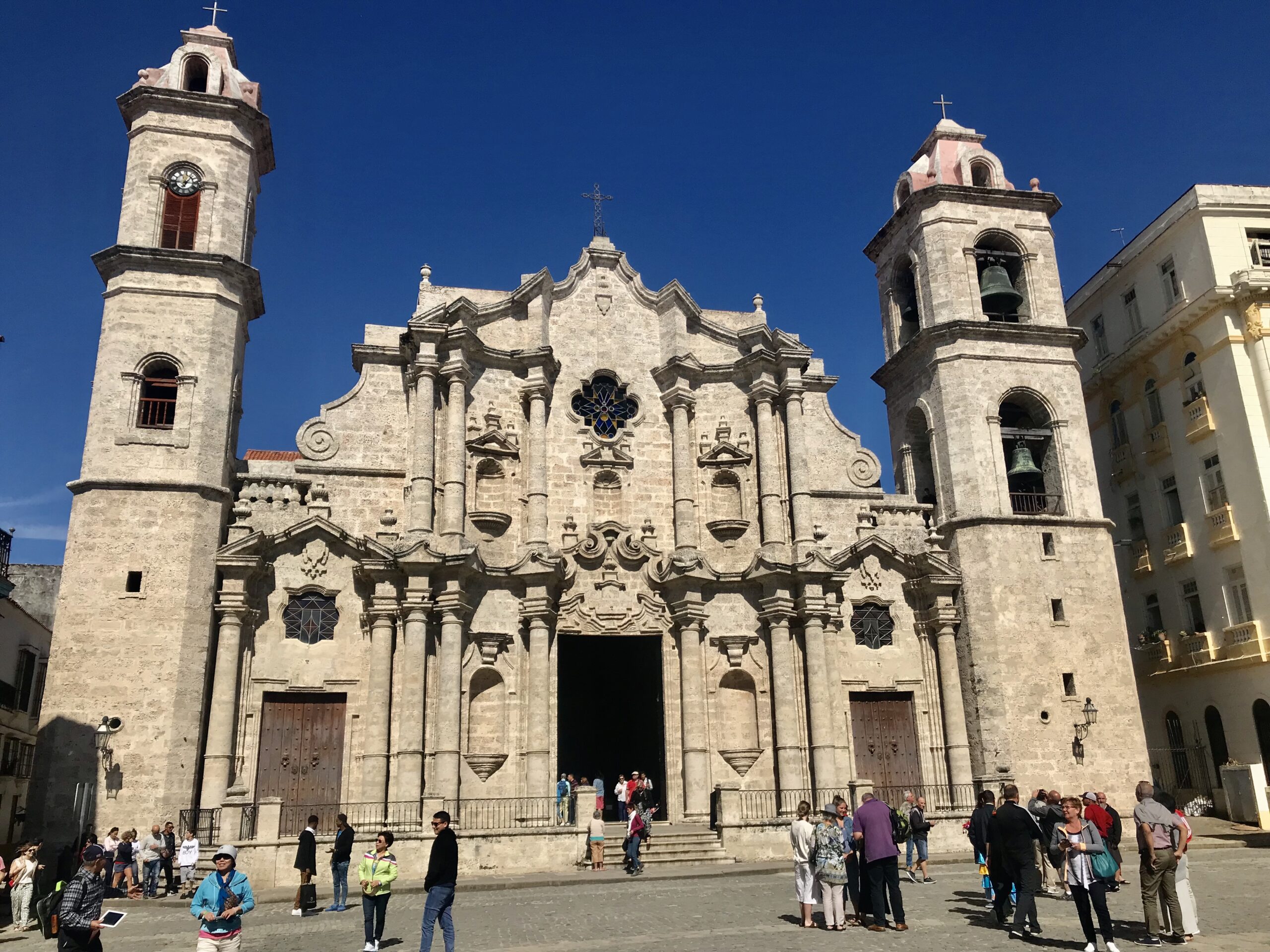
Havana Cathedral in Cuba. (Tacorontey, CC BY-SA 4.0, Wikimedia Commons)
Fernández de Cossío also mentioned the Biden administration’s commitment in May to allow remittances to Cuba, but said that still has not happened and there is no “commitment to dismantle the measures announced by the Trump administration to disrupt the remittances.”
In addition, although the U.S. government announced measures to boost internet penetration and interconnection in Cuba, the United States still prohibits access for Cubans to more than 200 private commercial websites, according to Fernández de Cossío. This includes sites for education, health, science and technology, art, culture and innovation.
The U.S. government, Fernández de Cossío stated, admits that it “intends to promote the Cuban private sector, not to contribute to the development of the Cuban economy, not to improve the standard of living of the population, not to help a majority sector of the population, but rather identifies it as an instrument of political subversion … a political weapon.”
What Biden Could Do
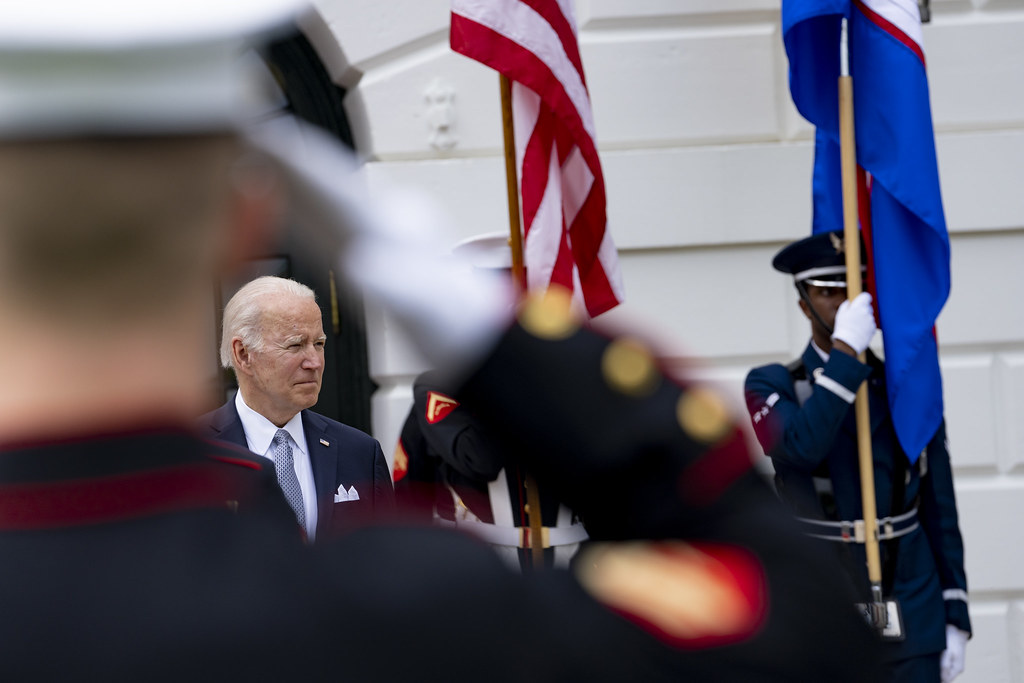
President Joe Biden in May 2022. (White House, Erin Scott)
Fernández de Cossío described steps Biden could take “to deliver on his declared priority of promoting human rights and caring for the welfare of the Cuban people.”
Biden could remove Cuba from the list of State Sponsors of Terrorism. In 2015, the Obama-Biden administration removed Cuba from the list. But at the end of Trump’s term, his State Department added Cuba back onto the list. Within weeks, Fernández de Cossío noted, “45 banks and financial institutions with long-standing relations with Cuba severed their ties with our country.” This impacted Cuba’s trade and access to credit. “It is a devastating impact,” he said. “And even today, on account of its presence on that list, Cuba is still encountering trade and financial organizations that refuse to interact with us for fear of retaliation by the U.S. government.”
Dozens of lawyers have signed an open letter to Biden, stating, “There is no legal or moral justification for Cuba to remain on the State Sponsors of Terrorism list.” They wrote, “Biden has the power to remove Cuba from [the list] and reverse many Trump-era sanctions through executive action. However, Biden has chosen to defend Trump’s aggressive policies.”
Trump also stiffened the economic and travel blockade and activated Title III of the Helms Burton Act, which was enacted to discourage foreign investment in Cuba. Trump’s activation of Title III greenlighted thousands of lawsuits that will discourage tourism and investment in Cuba. In one such lawsuit, U.S. District Judge Beth Bloom issued an order on Dec. 30 against four Florida-based cruise shipping companies that sailed to Cuba, requiring them to pay more than $400 million in damages. Fernández de Cossío pointed out that Biden could have suspended Title III like Trump’s predecessors. Activating Title III has had “a deterrent impact on our developmental purpose of attracting foreign capital,” he added.
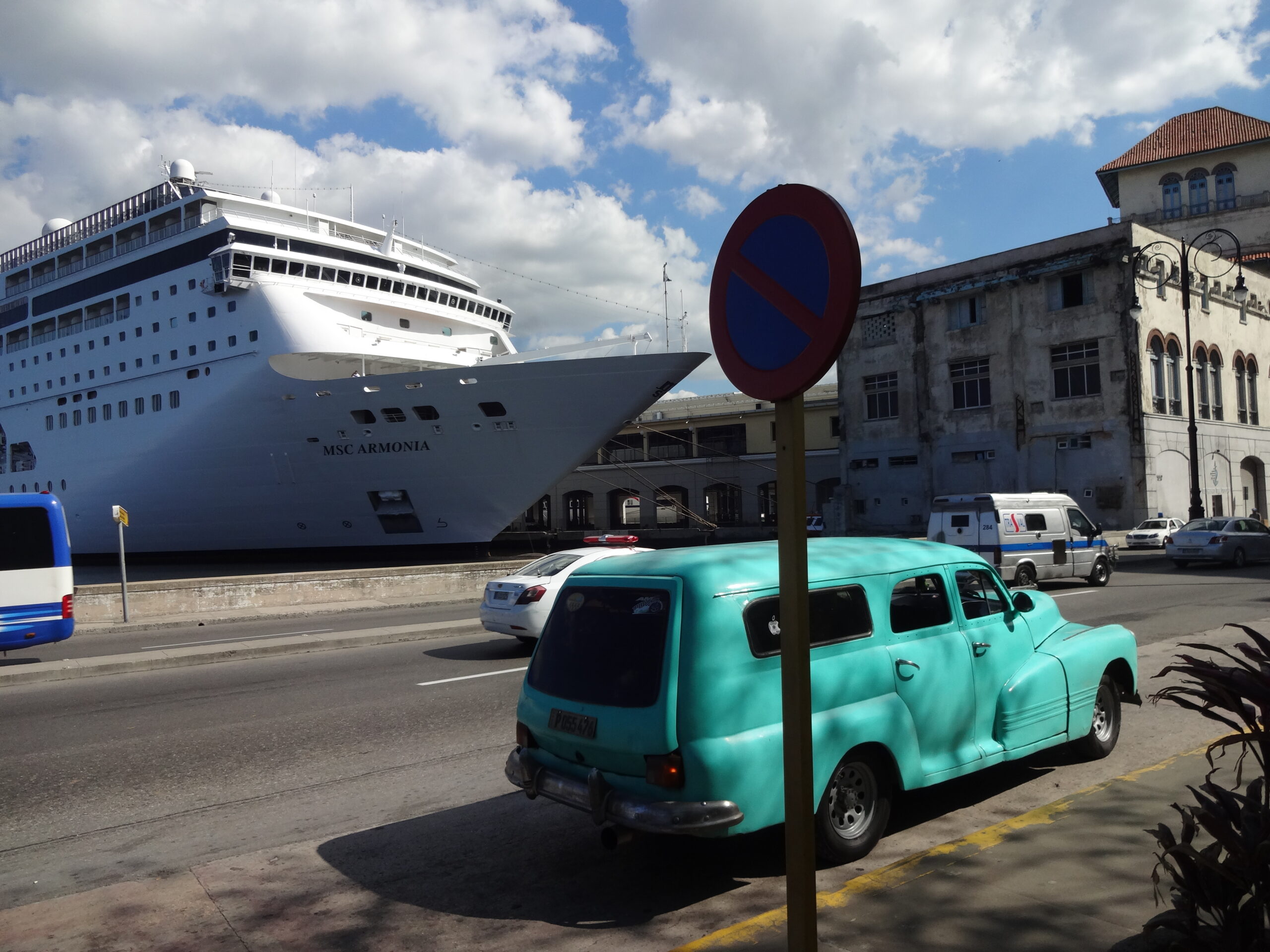
Cruise ship docked in Havana, 2018. (Rômulo Ferreira, CC BY 2.0, Wikimedia Commons)
In addition, “[The Biden] administration could have ceased the practice of pressuring governments in Africa, Asia, and Latin America to refuse medical cooperation provided by Cuba,” Fernández de Cossío said. “This U.S. action, of course, is intended to prevent dozens of thousands of people from receiving medical services, which is what Cuban doctors provide.”
Biden could also have ended “punitive measures, threats, and persecution against fuel exporting companies, shipping companies, port agencies, insurance and reinsurance agencies all aimed at depriving Cuba of fuel supplies that our country requires to function,” which “has had an extremely severe impact on the economy and the lives of the Cuban people,” according to Fernández de Cossío.
Regime Change
The blockade, the vice minister said, “has an impact on everything.” That includes electrical service, transportation, the availability of medicine and material for medical services, and the ability to obtain supplies for food production and building materials.
“The U.S. government cannot pretend to treat Cuba as if it were part of its territory or treat Cuba as if it were a colonial dominion, or treat Cuba as if it were an adversary defeated in a war. We are none of the three,” Fernández de Cossío declared.
He cited Cuban President Miguel Díaz-Canel’s observation that the intention of the United States is “to strangle the Cuban economy and thus try to provoke social collapse and a political crisis in Cuba.” Although the U.S. has failed in that purpose, it has led to “economic depression” in Cuba and “the extraordinary flow of Cuban migrants.”
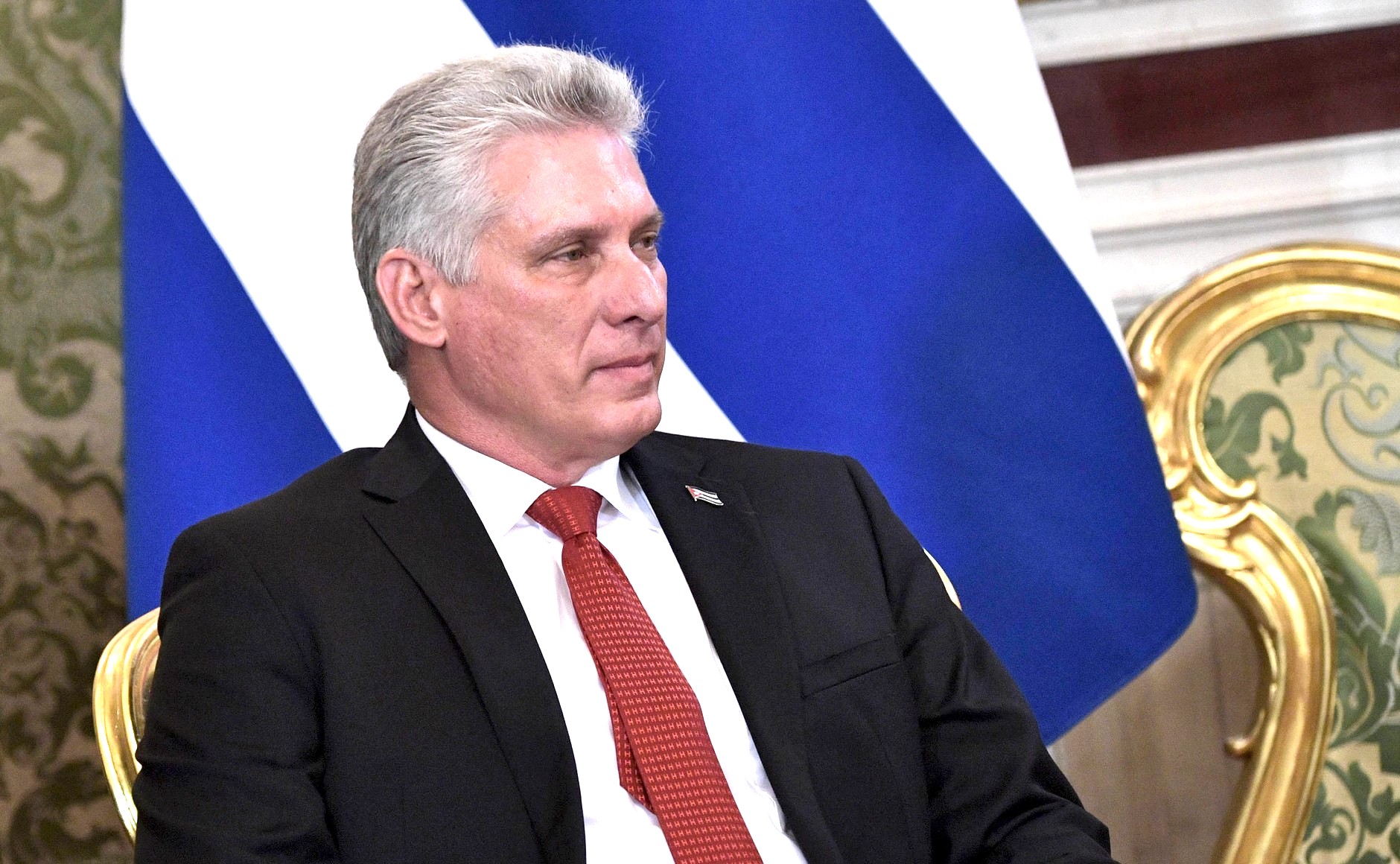
Cuban President Miguel Díaz-Canel in 2018. (Kremlin.ru, CC BY 4.0, Wikimedia Commons)
Biden himself has called Cuba a “failed state,” and his administration “is doing virtually all that it can to make it so,” Heitzer said.
“The embargo’s overt purpose is to strangle the Cuban economy to promote regime change,” according to the Alliance for Cuba Engagement and Respect (ACERE), a coalition of organizations working to end the Cuba blockade. The United States spends more than $25 million each year to fund regime change programs against Cuba.
On Nov. 3, 2022, for the 30th time, the United Nations General Assembly called for an end to the illegal U.S. blockade against Cuba. The vote was 185 in favor, two opposed (the U.S. and Israel), and two abstentions (Brazil and Ukraine). The resolution affirmed “the sovereign equality of States, non-intervention and non-interference in their internal affairs and freedom of international trade and navigation, which are also enshrined in many international legal instruments.”
Joe Biden must make good on his promise to reverse Trump’s actions tightening the blockade against Cuba, return to the measures taken by the Obama-Biden administration, and work to dismantle the illegal and immoral blockade once and for all.
Marjorie Cohn is professor emerita at Thomas Jefferson School of Law, former president of the National Lawyers Guild, and a member of the national advisory boards of Assange Defense and Veterans For Peace, and the bureau of the International Association of Democratic Lawyers. Her books include Drones and Targeted Killing: Legal, Moral and Geopolitical Issues. She is co-host of “Law and Disorder” radio.
This article is from Truthout and reprinted with permission.
The views expressed are solely those of the author and may or may not reflect those of Consortium News.
Support CN’s
Winter Fund Drive!![]()
Donate securely by credit card or check by clicking the red button:


Hasta la victoria, siempre!!! How about imposing world-wide sanctions on the US??? It has caused pain and misery all over the world…and still does. And yet…not a SINGLE SANCTION.
Vera if Americans don’t wake the hell up it will happen.
Between the exorbitant amounts of aid the U.S. government gives to Israels apartheid government, the endless intrusion of America’s national security apparatus into the affairs of other nations, this government’s arrogant, “You are either with us or against us” foreign policy doctrine the day will come when the US finds itself at the mercy of negative treatment from foreign counties we have ravished.
One example is the greed driven use if American farm land to produce ethanol from farmland that should be used to produce food. This is a money loosing proposition from start to finish, one the U.S. Department of Agriculture assists by providing funding. A gift to grain processors across America. America can and should do better.
All it will take is for the weather, for instance to cause two successive years of crop failures. The U.S. currently uses or sells most all of it’s annual harvests, leaving little or no surplus to fall back on.
Thanks CN
“…a State Department memo that advocated the “disenchantment and disaffection” of the Cuban people through “economic dissatisfaction and hardship” so they would overthrow the Fidel Castro government. The memo recommended the denial of “money and supplies to Cuba, to decrease monetary and real wages, to bring about hunger, desperation and overthrow of government.”
Why does the US do all that? Because they are the good guys. You can rationalize anything when you are the good guys. You do not have to abide by any laws, even your own laws, when you are the good guys.
BTW, whatever happened to Scott Ritter?
What I don’t understand (and haven’t for a long time) is this–if 185 countries of the world want the embargo to end, why aren’t they doing everything to work with Cuba? I know we are bully #1, but honestly, unite for once and openly defy our “rules based order.” If countries of the world can’t do it for a small country like Cuba, what hope is there? And I’d say the same for banks and corporations. They hold plenty of power. The USA can’t truly sanction them all if they all unite to defy the ridiculous policies against Cuba and a long list of other victims of our sanctimony.
Because they fear the consequences from Washington…more embargoes. I call it ‘lack of gonads’.
You have to wonder what it is that the U.S. government fears so much from giving Cuba a break.
On it’s face any argument for such draconian treatment seems ludicrous just the same as the war in Iraq and the war support for Ukraine . . . . . *’ uh, never mind.
Biden is living up to his promise that “nothing will fundamentally change” – unless he makes it worse.
I wouldn’t say Obama was better than Biden; he just pretended to want to open Cuba, to get it back for Americans to get their playground back and the self-exiled Cubans to return. Remember when they immediately started screaming that they wanted “their” land back? Cuba is a great country, despite the grief caused by the U.S., sheer punishment for beating the Americans with a successful revolution which worked out because the leaders were highly educated and intelligent and had a plan…free excellent education (focus on science and medicine), free excellent medical care for all. In fact, many Cuban medical personnel travel to areas of crisis to help: floods, tsunamis, earthquakes, pandemics, anyplace where they save lives. One doesn’t hear in the MSM about Cuba’s heroics.
I’ve traveled in over thirty countries and the last four were Palestine, Iran, Russia and Cuba all of which had wonderful people. I couldn’t live in Palestine because I’d be killed by the IDF, nor Iran, though the people were extremely friendly, because of religious rules (theirs, not mine), but I could live in Moscow, St. Petersburg, Pushkin (sparkling clean and no homeless; superior to Portland, Oregon, my town) and Cuba (“we’re all the same”). People there, because of the cruel embargo by the US (punishment…how dare they defy the US?), are hurt. For one example, making food rations necessary, but the difference between them and us is everyone gets the same number of eggs. Can you imagine that happening here?
Can’t wait for the final decline of this awful empire.
Yes, and the “border crisis” BS is another D/R distraction to get folks to focus on the powerless and not the centers of power and corruption.
I have no expertise in this matter, but it seems to me that Biden has Alzheimer’s, dementia or some other cognitive decline. The Puppet Emperor this cycle is even more “senile” (sorry to use such a term) than Reagan. A colleague calls the Biden presidency “elder abuse”. Yet we plebes are not supposed to notice the obvious…
Biden was honest from the very beginning of his term that we should not expect any changes in policy from the last Puppet Emperor, who displays forms of mental illness.
To be crude: we have crazy emperors, crumbling infrastructure, declining economic capacity, rampant institutional corruption, perverse politics, increasing domestic violence, bloated military/security/surveillance budgets, etc. I guess we can all revisit the history of the western Roman empire and see the striking similarities.
Viva Cuba.
Yes, Viva Cuba. I’ve traveled n more than thirty countries, the last four being Palestine, Iran, Russia and Cuba. Loved them all but probably couldn’t live in Palestine (don’t want to be killed by the IDF) or Iran for religious reasons (thiers, not mine). However, I would prefer St. Petersburg or Moscow or Pushkin (all spotless, no homeless) to my town Portland Oregon any day. But especially I would like to move to Cuba where “we’re all the same,” there’s free excellent education, the best healthcare on earth. Bet most people don’t know that. Cuba’s medical personnel go all over the world to save lives in a crisis, whether pandemics, floods, tsunamis, earthquakes, wars. Best doctors. Yet the US foreign policy is hegemonic. That’s it. Cuba’s revolution was a success because the leaders were extremely educated, had a workable plan and carried it out. The U.S. has been in a cruelity mode ever since. They were beaten by a little island 90 miles away, so by god, those Cubans must suffer. That the U.S. and Israel are alike is evident by the Apartheid in Israel and the embargo on Cuba. My question is why Americans let either happen. There’s more of us than them.
Don’t expect Nod to do much in the way of positives in foreign policy.